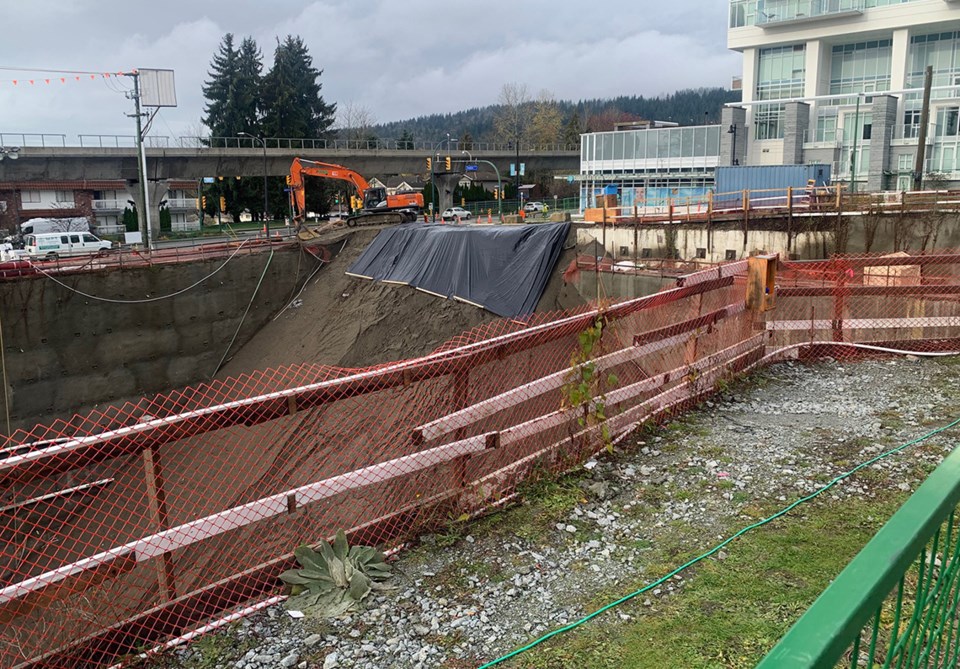An engineering professor says insufficient engineering or sloppy workmanship could have been responsible for the collapse of a temporary shoring wall at a Coquitlam construction site.
Nobody was injured when the wall cracked and gave way last Wednesday, Nov. 29, sending a torrent of soil and rock cascading into the deep excavation for a new 41-storey condo project being constructed by Vancouver-based developer, Amacon, at the corner of Foster Avenue and North Road.
Dr. Perry Adebar, a professor of structural engineering at UBC's department of civil engineering, said he noted the lack of a welded wire mesh that’s used to reinforce such temporary walls when he viewed a video of the failure that was captured by a witness and posted to social media the next day.
Adebar said the shotcrete, which is a form of concrete that’s sprayed into place, may also have been too thin or applied poorly.
He explained temporary shoring walls are common at large excavations as they prevent the soil on the sides from collapsing inward.
Adebar said shoring walls are typically built in stages.
"You excavate a certain depth hole with straight sides and then you work off the ground within the hole to build the shoring walls around the sides of the excavation," he said.
"Then, you excavate further and repeat. Eventually you have a deep excavation."
Adebar said the shoring wall is stabilized by soil anchors, known as "tiebacks" or "soil nails," that are drilled into the sides of the excavation.
"A geotechnical engineer determines how deep the anchors need to go into the soil and at what spacing the soil anchors need to go."
Adebar said a light wire mesh is used to keep the sprayed shotcrete in place against the soil while it’s still wet and steel plates anchor the tiebacks to the shotcrete. He said the apparent lack of such a mesh allowed chunks of concrete to peel off the wall, releasing a large amount of soil into the excavation.
Adebar said at the end of the video, the visible tiebacks still seem to in place, so it's unlikely the collapse is a result of their failure. He said observations of the first cracks in the wall by workers who were onsite that day may provide clues why it broke away.
WorkSafeBC said its officers attended the site and are conducting an investigation.
Last Friday, Dec. 1, the city of Coquitlam said it's also requiring the developer hire a third-party geotechnical engineer to supervise repairs.
Monday, the city announced those repairs would no longer continue through the night, although Foster Avenue remains closed between North Road and Whiting Way to allow heavy trucks and equipment to come and go. The 157 transit bus has also been rerouted.
Further alerts for local residents are being posted to a special website the city has launched.
Doug Vance, Coquitlam's building permits manager, said the city relies on developers to take the lead on issues related to their construction sites.
As well, the construction of temporary shoring walls is not regulated by the BC Building Code.
Engineers and Geoscientists BC (EGBC), the profession's regulatory body in the province, said it sets standards for the ethical conduct and practices of professional engineers, geoscientists and engineering companies.
If an investigation determines those standards have not been met, said EGBC spokesperson Megan Archibald, the regulator could take action through its own investigation and discipline process. Sanctions can include suspension of an engineer’s EGBC registration that allows them to practice in the province, a requirement to complete educational courses and a review of their professional practice. Egregious violations can be punished with outright cancellation of EGBC registration along with fines.
UBC’s Adebar said as repairs continue at the site, a geotechnical engineer will be able to estimate how much additional movement of soil could occur and how that might impact nearby properties.
On Friday, city works crews were called in to stop water leaks at the site.




